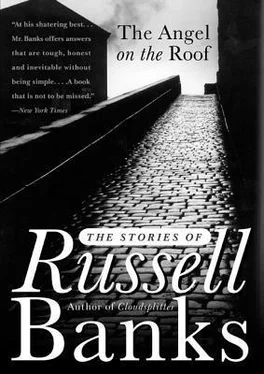Earl places the receiver in its cradle. Then he stands there, looking into his mother’s blue eyes, and she looks into his.
She says, “He won’t call back.”
Earl says, “I know.”
In late April of a recent year, I drove from my home in New York City across New Jersey to deliver a lecture at East Stroudsburg University, which is located in Pennsylvania at the southern end of the Pocono Mountains, not far from the Delaware Water Gap. I arrived a few hours earlier than my hosts expected me, so that, once there, I was free to drive twenty miles farther north to the small town of Tobyhanna, where my mother and father lived with me and my brother and sister for a single year, 1952, when I was twelve, my brother ten, my sister six.
For the five of us, the year we lived in Tobyhanna was the most crucial year of our shared life. It defined us: we were that family; we have remained that family. The following summer, my mother and father got divorced, and from then on, although we were the same, everything else was different. Not better, just different.
Looking back, I see that both my parents were careening out of control with rage, frustration, and fear. For years, my father had been plotting ways to leave my mother, whose dependency and hysteria had imprisoned him then, as later they would me. For her part, my mother had been just as busy trying to keep him from leaving, which only made him feel more trapped today than yesterday. He was thirty-eight; his life was skidding past. And he thought that he was somehow better than she, a more important person in the overall scheme of things than she, and he acted accordingly. This made my mother wild.
My father was a plumber, and he had been hired by a New England contractor as superintendent of all the plumbing, heating, and air-conditioning installation in an enormous Army shipping and storage depot being built in Tobyhanna. It was one of the first big postwar military bases commissioned by the Eisenhower administration. My father was the company’s man sent down from Hartford to run its largest out-of-state job, an extraordinary position for a young journeyman pipe fitter with no more than a high school education, a man whose biggest job up to then had been adding a wing to the Veterans’ Hospital in Manchester, New Hampshire. But he was bright, and he worked hard, and he was very good-looking, and lucky. People liked him, especially men, and women flirted with him.
He was a heavy drinker, though, starting at it earlier every day. And with each additional long night’s stay at the bar in Tobyhanna, he turned increasingly nasty and sometimes violent. The job he held was, in fact, way over his head, and he was terrified — not of being fired, but of being found out, and not so much by other people, as by himself.
I drove my car into Tobyhanna, a poor, bedraggled batch of houses and garages and trailers strung along a winding two-lane road abandoned long ago for the Stroudsburg-Scranton highway, and saw at once the bar where my father used to spend his evenings after work and as much of his weekends as he could steal from the house in the woods where he had established his nervous wife and three children. It was a small, depressing, impoverished town, despite the presence of the Army depot — or perhaps because of it.
I drew my car up to the bar on the main street, shut off the motor, and went inside. It was dark, dirty, and damp, smelled of old beer, sweat, and pickled, hard-boiled eggs, with a jukebox in the back, a U-shaped linoleum-covered bar that ran the length of the room, and several dim, flickering neon beer signs in the window.
I ordered a beer from the middle-aged woman behind the bar, whose exact, round, dun-colored double — her twin, I thought, or surely her sister — sat on a stool on the other side of the bar. She sat next to a man with a tracheotomy who was talking to her in a harsh, electronic moan.
A second man was perched on a stool a ways down from me — a scrawny fellow in his mid-fifties whose arms were covered with badly drawn tattoos. His head was wobbling on his neck above a bottle of beer, and he seemed not to notice when I sat down.
The place had not changed a bit in the thirty-four years since I last entered it. The doubling image of the round woman behind the bar and the woman sitting by the man with the hole in his throat acted like a drug or a mathematical formula or a vision, instantly doubling the place itself with my memory of it, matching my arrival in Tobyhanna today with my memory of a Saturday in winter, when my father drove me and my younger brother into town with him — ostensibly to pick up a few groceries or some such errand. It’s no longer clear to me why we three males left the house and hearth for town that day, just as it was not clear to me why I decided to drive north from Stroudsburg, when I more easily and pleasantly could have strolled around the college campus for a few hours, killing time. There was a powerful need to go there, but no remembered reason.
I remember my father bringing my brother and me straight into the bar with him, and I remember his cronies — soldiers and construction workers — buying my brother and me Cokes and potato chips. They teased us, because we were miniaturized imitations of men, and praised us for our manliness, because they were men, while down along the bar my father leaned over a friend’s shoulder and talked intently into his ear, then smiled at a fat woman (or so she looked to me) with bright red lipstick who sat next to him and patted her forearm affectionately, and soon he switched his attention completely over to her, leaving his male friend to drink alone for a while. I watched this take place.
The bartender waddled over to me, picked up my nearly empty bottle, and studied it and set it back down. “Want another?”
I shook my head no.
She lit a cigarette, inhaled furiously, a large, red-faced woman smoking like a steamship, and she studied my face the way she had examined my beer bottle. “You’re not from around here,” she stated.
“Last time I was in here was thirty-four years ago,” I said.
She laughed, once, more a bark than a laugh. “It hasn’t changed.”
“Nope,” I said. “It’s the same.”
The man next to me at the bar, his head wobbling like a heavy flower on a stem, was alert, more or less, and watching me now. “You ain’t old enough to’ve been in here thirty-four years ago,” he growled.
“I was only a kid then. With my father. My father brought me in here.”
The man sat up straight and swept his arms around and pointed at each of the four corners of the dingy room. “This place, it hasn’t changed,” he said. “Where you from?”
“New York City.”
“Hah!” he laughed. “This,” he said, waving his arms again, indicating the three other people in the bar as if they were a place, “this is the way to live! You never lock your doors here. It’s safe,” he proclaimed. “Not like, not like your goddamned New York City.”
I nodded in agreement, got off my stool, and made for the door.
He called after me, “Hey, buddy! You’re welcome!” He grinned through loose red lips and broken teeth and started to cackle at his joke on me and then cough and finally wheeze and whoop with joy, while I hurried out the front door to my car.
On our way home from the bar, me in front in the passenger’s seat, my brother in back, my father said, “Listen, boys, let’s just say we spent the time at the depot. In the office. I should’ve gone over some drawings there, anyhow, so we might’s well say that’s what we did, right?” He looked over at me intently. “Right?”
“Sure,” I said. “I don’t care.”
I peered out the window at the pale curtains of snow falling, the houses that occasionally flashed past, the dark shadows of trees, and of the Poconos closing off the sky. I didn’t care.
Читать дальше












